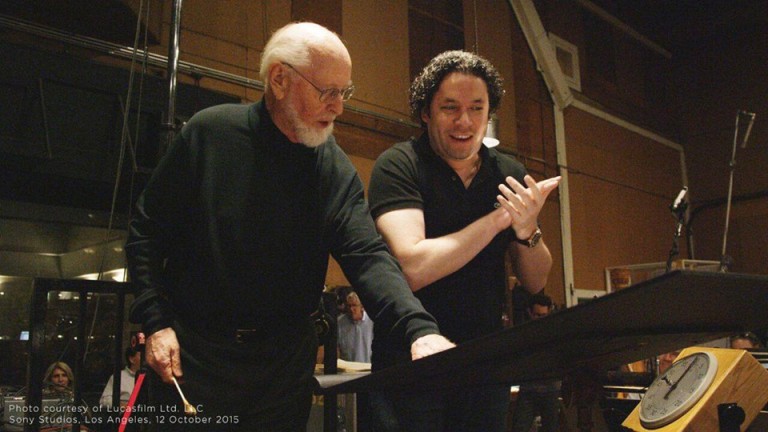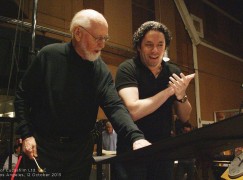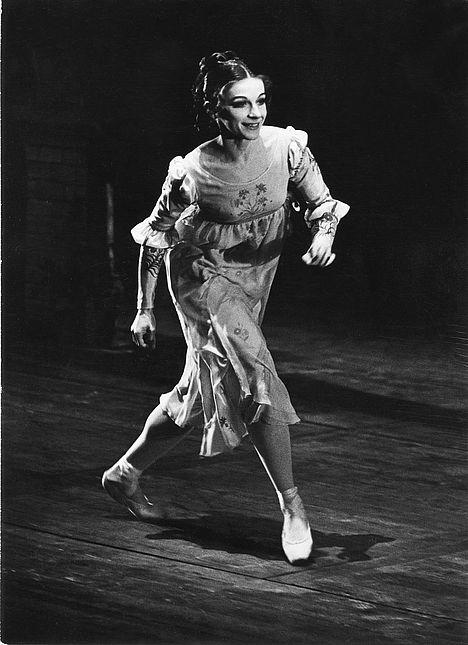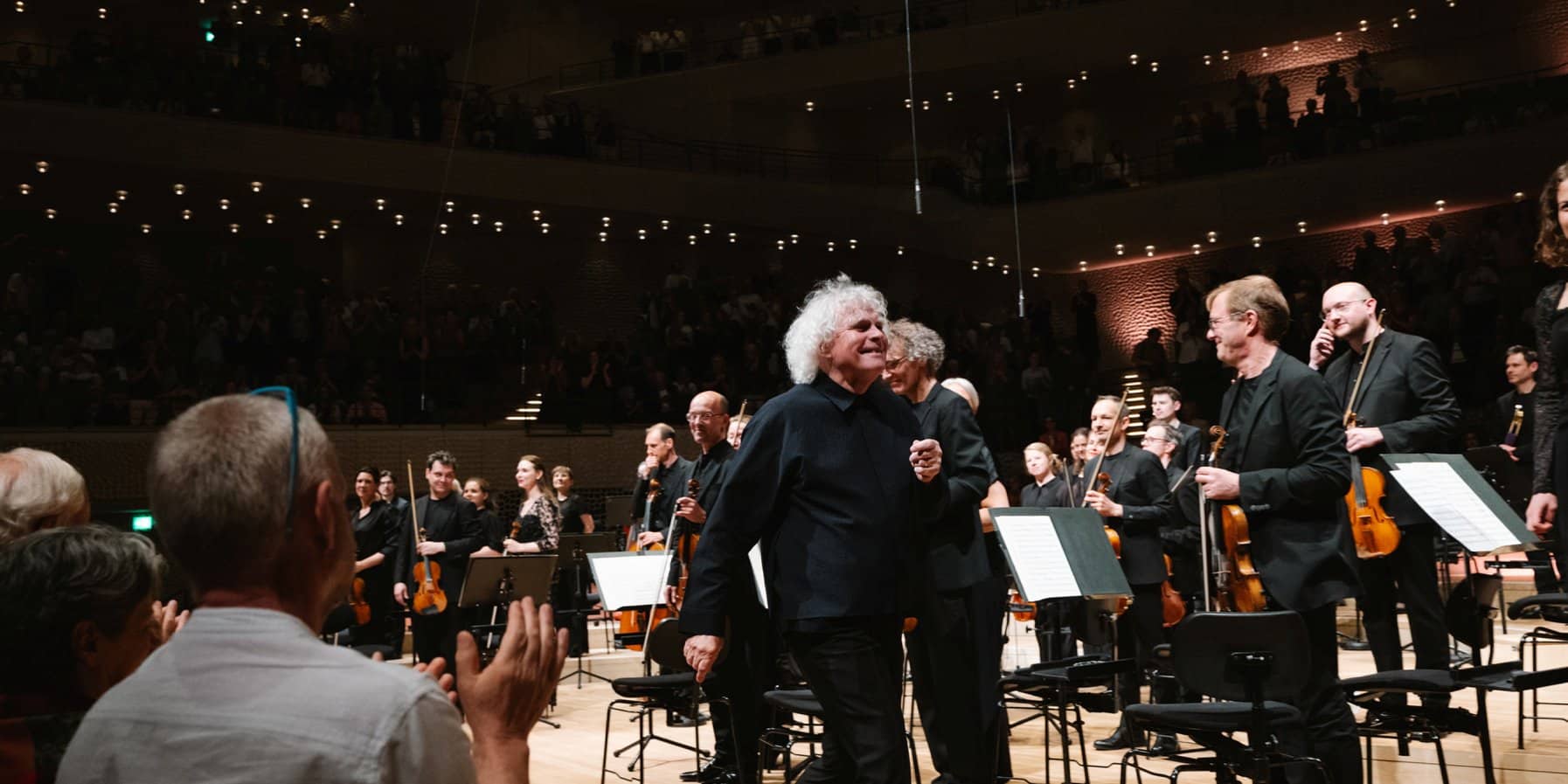Gustavo Dudamel is the force that awakens Star Wars
mainJust up on the maestro’s webpage:

When John [Williams] called and asked if I would conduct the opening music and closing credits for this historic film, I remember thinking “he’s joking”. John has such a wonderful sense of humor and I somehow thought that there must be a catch. It turns out, there was: I couldn’t tell anyone, and John wasn’t going to tell anyone, either!! We kept it a total surprise, so that when I walked into the studios to lay down the Star Wars tracks in October, it took EVERYONE by surprise: musicians (some of whom were from the LA Phil), the Lucas creatives, the Disney lawyers – you see, John had managed to keep it a complete surprise from everyone except for him and George Lucas! John Williams is the Mozart of our day. I cannot tell you how inspired I felt when I held his score in my hands for the first time, stunned by the beauty of his writing, he’s a genius. You know, we play John’s music all the time at the LA Philharmonic, he’s like family to us. Even my four-year-old son Martin sat in the sound booth cheering. You cannot imagine – utter joy for his father.
Cuando John [Williams] me llamó y preguntó si dirigiría la música de apertura y de los créditos de cierre para su histórica película, recuerdo pensar “está bromeando”. John tiene un gran sentido del humor y por alguna razón pensé que había algún truco. Efectivamente, lo había: ¡no podía decírselo a nadie, y John no le diría a nadie tampoco! Guardamos el secreto, así que cuando entré a los estudios para grabar en octubre, tomó a TODOS por sorpresa: músicos (algunos que eran de la La Phil), los creativos de Lucas, los abogados de Disney – verán, John había logrado mantener la sorpresa para todos excepto para él y para George Lucas! John Williams es el Mozart de nuestros tiempos. No les puedo decir lo inspirado que me sentí cuando tuve por primera vez sus partituras en mis manos, anonadado por la belleza de su escritura, es un genio. Saben, tocamos la música de John todo el tiempo en la Filarmónica, es como familia para nosotros. Hasta Martín, mi hijo de cuatro años, se sentó entusiástico en la cabina. No pueden imaginar – felicidad total para su padre.
Photo courtesy of Lucasfilm Ltd. LLC






Well, this should warm up the cold winter nights.
It’s interesting to hear one of the world’s most famous conductors say that John Williams is the “Mozart of our day.” As a film composer, Williams is in a class by himself, not only currently, but even historically. His music is great, but to say that he is the Mozart our day is ridiculous. Dudamel’s comment speaks to the artistic poverty and superficiality not only of our star conductor system, but to the modern orchestral world as a whole.
spot on, Mr. Osborne.
I completely agree. I am still very unconvinced Dudamel is anywhere near as good as some claim.
Furthermore, whether Williams even approaches Korngold as a composer of film and classical scores in open to question.
and Bernard Herman for that matter.
Neither are many conductors,Marin Alsop is an example. PR agents to die for are the problem.
Very “LA”, I’m afraid.
The biggest failure here is that London lost out on recording the seventh score, and arguably the biggest of the franchise.
You all enjoy the comfort of your select classical music world. It will disappear and vanish forever along with all of you.
This week’s prediction of doom and gloom, by MXJK.
Ain’t you a barrel of laughs?
I also was surprised that the LSO did not get this job.
It’s like hiring someone who merely resembles Harrison Ford to play Han Solo.
I suspect it’s less to do with the LSO and more to do with John Williams’ advancing age and recent health issues. I’m not sure his doctor would recommend the amount of transatlantic flying required to work with a London orchestra on such a film score…
According to one unofficial inside source, it seems that the LSO was not involved “for various scheduling reasons”; see:
http://www.garethdaviesonline.com/blog/the-walk-of-fame
Dudamel is a joke, a satire of the conducting star system, in which skillful marketing creates the fame. He is, of course, not alone in being the beneficiary of same, but he does represent the widest disparity between musicianship and hype.
Yeah, let the Willams bashing commence.
Seriously, if there is a living composer out there who has done more to inspire young people to pick up an instrument and play in an orchestra, please tell me; I’d love to learn about him or her!!!
Williams is a marvel , Dudamel is a marvel -they’re both marvels, we live in a marvelous
age of music making Daniel F. should take note.
Of exactly what “should” I “take note”? I always take note of what you write, Milka, but your latest “thought” is hard to make sense of. It is comforting, though, to know that you are looking out for what I should be paying attention to.
The sensibilities of the age which gives us a Williams , a Dudamel ,a Perlman .
Daniel, I guess Milka was being sarcastic…
like it or not! He’s the one chosen. Dudamel is an extraordinary orchestra conductor recognized internationally through Simon Bolivar orchestra and many others works in L.A
John Williams is an excellent composer of musics for movies. He has talent for it and that’s all. To say , as Gustavo Dudamel, that ” he is the Mozart of to day” is properly of an inconscious and stupid pretention!
I would differ that it is not a stupid pretension -but that they “know” their audience
which consists mostly of people ignorant to the “art” plus those in the field who perhaps had higher ideals but must now put bread on the table . The Mozart observation is made for the vast audience that senses their ignorance to the art but desire to appear cultured .
It’s the “Pops” audience where music is a wallpaper background to daily events.
Outrageous to describe JW as a Mozart of today. Dudamel is a fine conductor but clearly not all that penetrating in terms of intellect.
As an aside, Irvine Arditti played on the original soundtrack for Star Wars.
John Williams is clearly an immensely talented man. He is one of the most successful film composers in history, and is a successful conductor, composer of music not associated with films or TV, and more. I have never met him, but I am told that he is also a nice fellow.
The analogy to Mozart is inapt. Dudamel had the right idea, but chose the wrong historical figure.
If anything, Williams is a modern Rossini: someone who can work with other artists (Williams: with Spielberg, Lucas, etc.; Rossini: with his librettists, set designers, and singers) to create collaborative works of art that are greater than the sum of their parts and that transcend the efforts of most others.
Try to picture Star Wars with some other composer’s music. There are many qualified composers who could have produced competent scores, but would any of them be as iconic?
Now try to picture William Tell without Rossini’s iconic music. Or Barber of Seville, or a number of his other operas.
(At first I wanted to use a ballet analogy, but, to be frank, he’s a better composer than the best-known 18th and 19th century ballet composer specialists, e.g. Adam).
Even the Rossini comparison doesn’t quite stand. JW’s scores, for all their sweep and impact are largely a pastiche…. A very skilful assembalage of different composers. The same is not true of Rossini who has a very distictive, and contemporary voice. There are chunks of Star Wars which just sound like insipid takes on Prokofiev’s Romeo and Juliet, and it doesn’t matter of course but the links to great composers of the past are misconstrued.
Bingo !!!!!!!!!!
You may have a point. Then again, Rossini’s music was sometimes a pastiche of itself. He certainly recycled his own music.
Bach was also very resourceceful in recycling his own music. Not a problem.
Poulenc is a composer who one might accuse of being an assemblage of other composers and yet his personality is so strong, it always sounds quintessentially like Poulenc. The same is not the case with JW, or (to my ears) the very elegantly crafted music of Moszkowski if we have to go back to a minor figure from the 19th century, though JW is still eclipsed by him.
I almost mentioned Poulenc in my previous message, before redacting it. I was reminded of that aspect of his music when I recently performed in his Gloria, which probably wouldn’t sound as it does without the influence of the Stravinsky Symphony of Psalms. And I once read a paper about all the influences and references embedded in just his Oboe Sonata.
Stravinsky’s music, in turn, wouldn’t sound as it does without his many influences. Rite of Spring sounds at one moment like Debussy, another moment like Rimsky-Korsakov. Pulcinella? ‘Nuff said.
As for John Williams’s music, I think the main point of my analogy was lost: it is the collaborative aspect of his work with film directors that is his primary strength — or, to put it another way, one of the strengths of certain movie makers is to hire John Williams to provide the scores for their movies. Irrespective of what certain people may feel about the pastiche nature of some of his music or his Neoromantic style, the movies are augmented by his music.
I think perhaps an even more apt parallel could be John Philip Sousa. In his youth, Willams was a conductor and arranger for the band of the US Air Force for three years and to me his most durable and original compositions are band music, like the themes for Superman, Star Wars, Indiana Jones (all marches) and the music for the 1984 Olympics. His other compositions tend to sound more eclectic (Prokofiev, Korngold, Vaughan Williams, etc); it tends to sound pleasing enough while you’re listening but is not very memorable.
The Safford observation displays a profound ignorance to the “art “of music .
The Milka observations display a profound absence of almost anything positive about the “art” of music.
I feel sad for you.
Without feeling sad I thought the observation concerning the Safford comments quite
” positive”. Hilary is much too kind and tolerant of the pretentiously uninformed, I however feel it encourages them to more pseudo intellectual nonsense.
Why do you take such pleasure in such negativity?
Williams is indeed a marvel, great composer but hey ‘of our day’????? What about Ennio Morricone? He’s still around. Michel Legrand? Surely they are as talented as mr Williams and still around…..
Not enough schlock from Hollywood marvels we get two more .